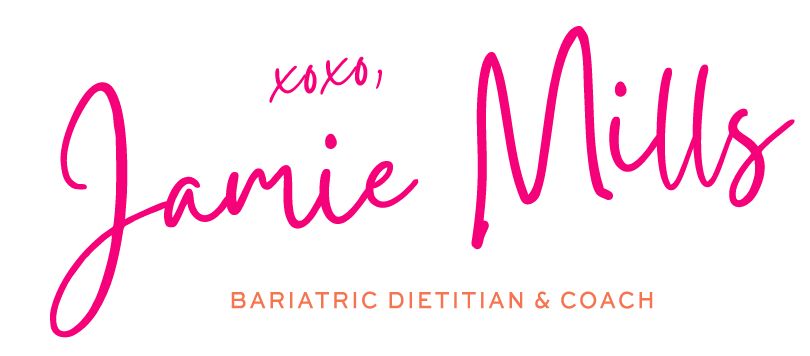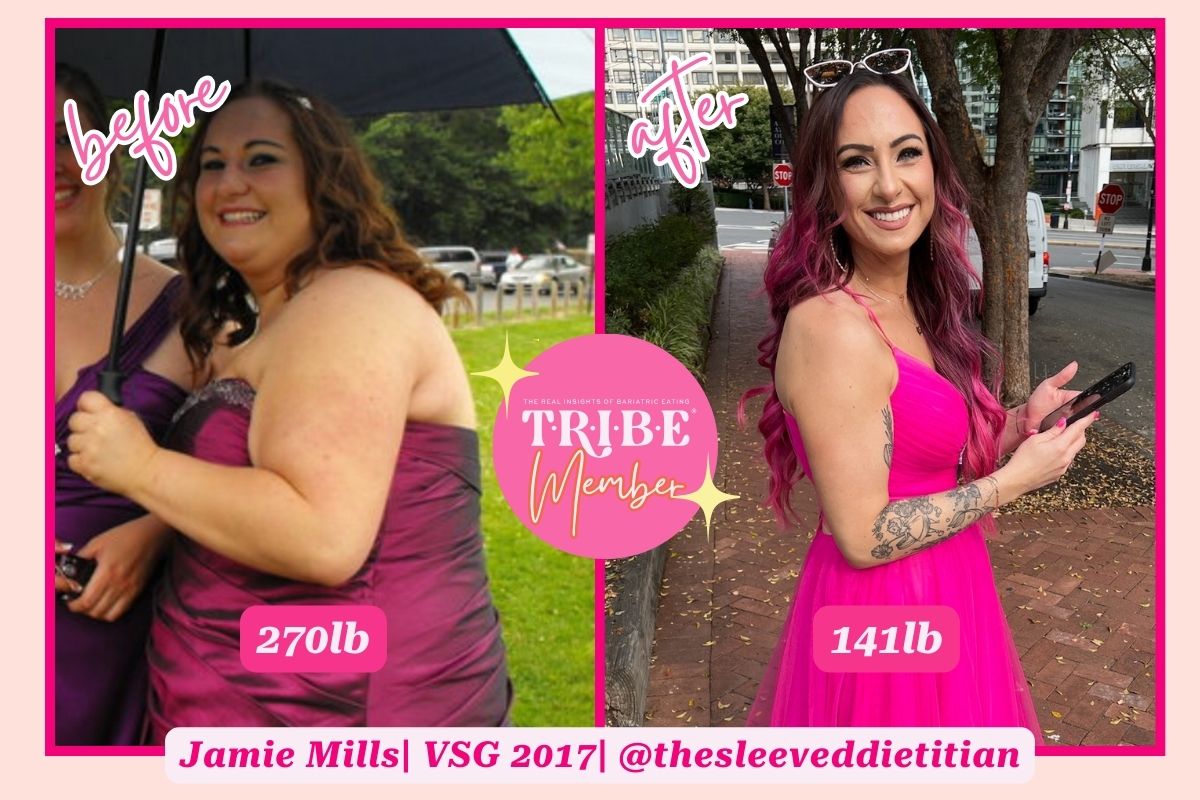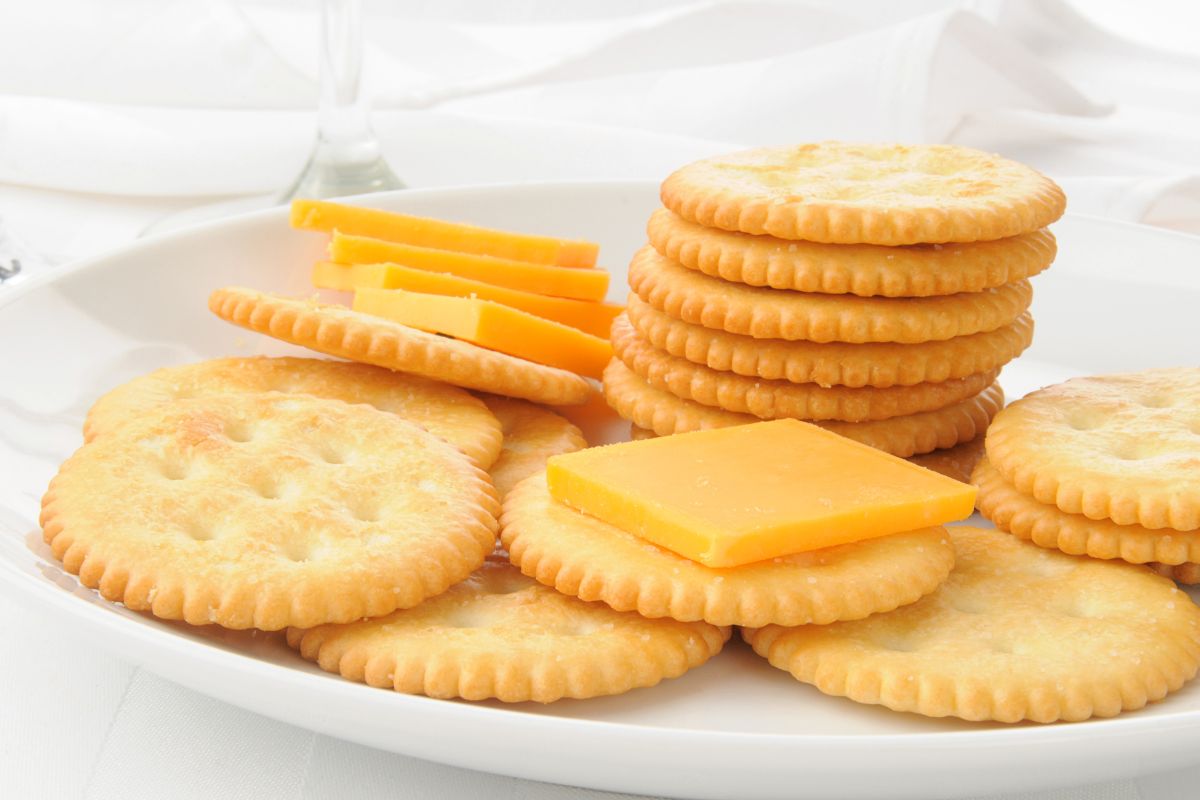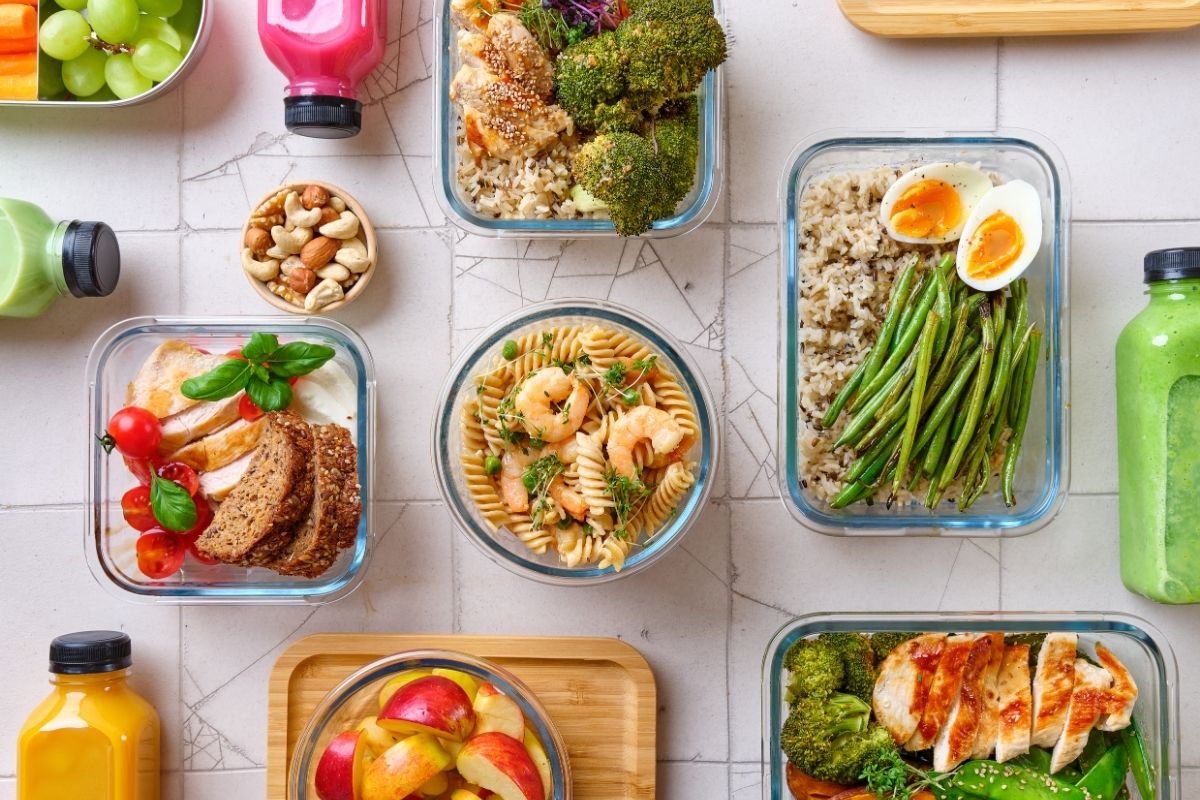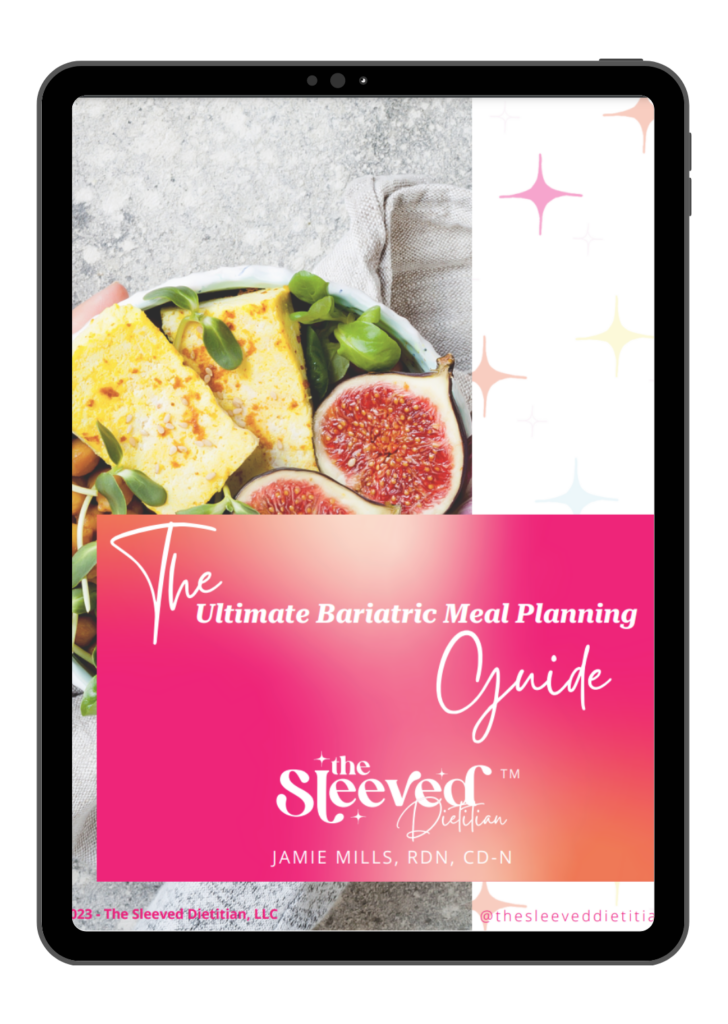If you’re reading this there’s a good chance you’ve either had gastric bypass OR you’re thinking about having it. In either case, let me just say, congratulations! Choosing to have weight loss surgery is a huge step in overcoming your struggles with weight. I know, because I’ve had weight loss surgery too! But you’re probably wondering “What can you never eat again after gastric bypass?”
Hi! I’m Jamie! I’m a Registered Dietitian who specializes in bariatric surgery. Not only have I worked with thousands of weight loss surgery (WLS) patients over the years, but I’m also a bariatric patient myself! I had my surgery back in 2017.
I remember when I was planning on having surgery I was SO scared about all the life changes that would come with WLS. At the time I was really nervous about all the foods I would never be able to have again. It felt like I was giving up so much!
And while it’s true, there are some foods you may never be able to eat again, that list of foods is probably much shorter than you may think! Today I’m going to share with you all about the foods you can never eat again. I’ll also be covering all the nuances that come with that statement!
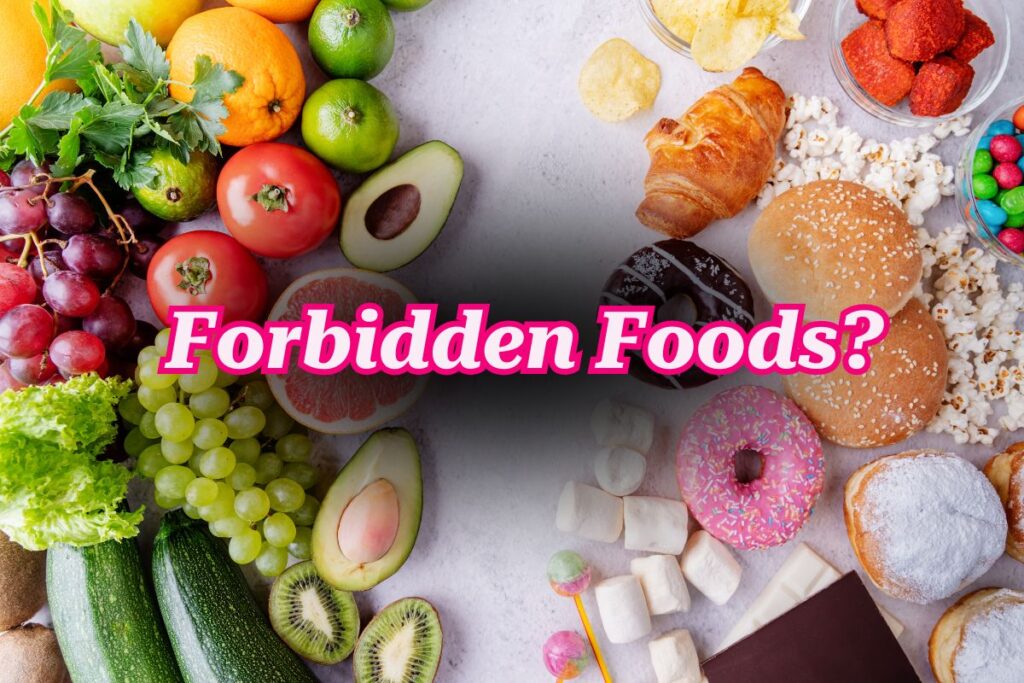
There’s no definitive list of “forbidden foods.”
The good news is, that if you have gastric bypass there isn’t a definitive list of foods that are 100% off-limits. It’s a common misconception that you can’t eat certain foods for the sake of your weight loss results.
Unfortunately, you’ll see a lot of misinformation, especially on platforms like Facebook support groups or Reddit. If you scroll through these forums, you’ll likely see a lot of other fellow gastric bypass patients judging and bashing one another for the foods they choose to eat, specifically carbohydrate foods. To learn more about carbohydrates after weight loss surgery click here.
Realistically, while you likely have long-term weight loss goals to hit and maintain, there isn’t any one singular food that is off limits for the sake of your weight loss. No one food is going to completely deter you from hitting your weight loss goals.
The bigger concern is looking closely at the foods you can tolerate after gastric bypass, as some foods might make you not feel so good or can even make you sick. Many gastric bypass patients are prone to something called dumping syndrome, which can prevent them from being able to eat certain foods.
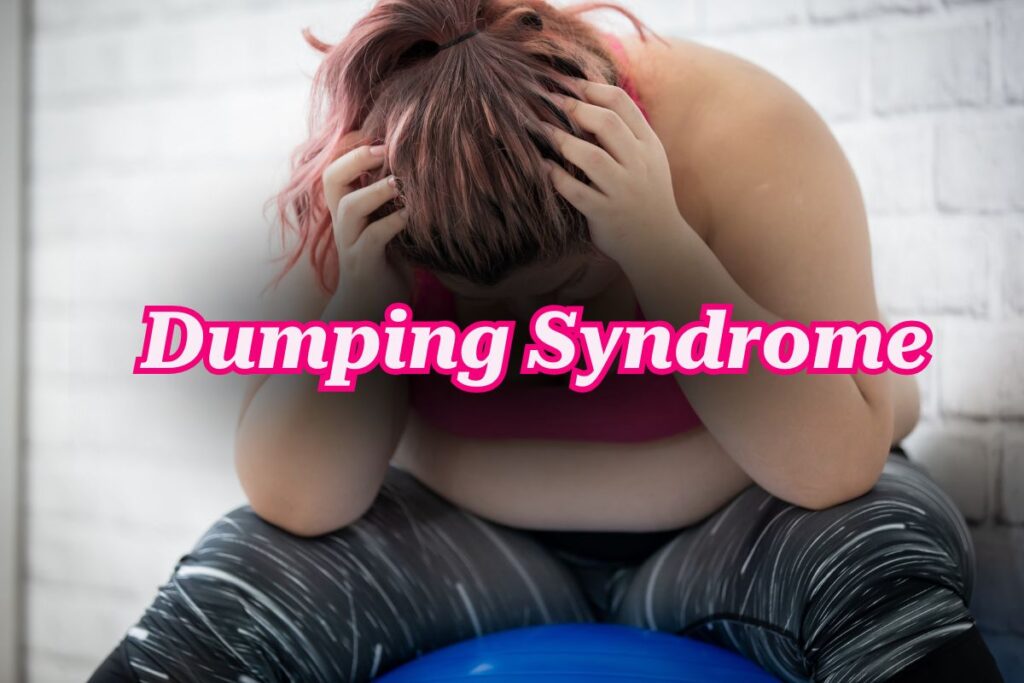
Dumping Syndrome
I know the name implies that this must be a syndrome that sends you running to the bathroom. And while that may be true for some, dumping syndrome is much more involved than just needing to use the restroom.
What is dumping syndrome?
Dumping syndrome is something that occurs when foods, typically high in sugars and fats, moves through your stomach to your small intestine too quickly, causing a slew of unpleasant symptoms.
Common symptoms include:
- Nausea
- Feeling bloated or uncomfortably full
- Cramping
- Rapid heart rate
- Dizziness
- Cold sweats
- Diarrhea
These symptoms typically occur within 1-3 hours after eating a high sugar and/or high fat meal. Although, some may experience it as soon as 10-30 minutes after eating something that doesn’t agree with them.
It’s also a myth that only gastric bypass patients experience dumping syndrome. I had the vertical sleeve gastrectomy back in 2017 and I personally have experienced dumping syndrome as well.
When this happens to me, it is incredibly unpleasant. While everyone experiences it a bit differently, for me, what happens after I eat something high in sugar and/or fat (especially in liquid form such as ice cream), is I start to feel nauseous and queasy.
Along with that comes a sense of panic (rapid heart rate), sweating, and feeling like I need to vomit and use the bathroom at the same time (although neither of these things usually happens it just feels like it’s going to). It typically leaves me feeling very tired and burnt out afterward.
Why does dumping syndrome occur?
This typically happens from rapid gastric emptying. This means that the food you are eating is moving too quickly from your stomach to your intestines.
When foods move quickly through your intestines it causes an influx of fluids into your small intestine. This rapid change in fluid balance is what can cause the cramping/bloating, nausea, and diarrhea.
After weight loss surgery, specifically after gastric bypass, because of the way your anatomy has been changed. Between a much smaller stomach pouch, which holds less food, and the fact that the first section of your small intestines has been bypassed, the food has a much shorter distance to travel, which can cause the rapid food movement.

Foods that are most likely to be a problem after gastric bypass
Dumping syndrome is just one of the reasons you may not be able to tolerate certain foods after gastric bypass. In addition to foods that may cause dumping syndrome, there are other foods that commonly cause discomfort post-op for a variety of reasons.
Foods you may never be able to eat again after gastric bypass:
- High-sugar foods: as already mentioned, foods high in sugar like ice cream, candy, and sugary drinks like soda or juice, can cause dumping syndrome.
- High fat, greasy, and/or fried foods: greasy and fatty foods like fried chicken, can also cause dumping syndrome and make you nauseous or uncomfortable.
- Carbonated beverages: sometimes carbonated drinks, even sugar-free ones like seltzer water, can cause uncomfortable gas and bloating.
- Refined carbohydrates: simple carbohydrates like bread, rice, and pasta expand in your pouch from the fluids in your stomach. This can make even small portions very uncomfortable.
- Raw fruits and veggies: the fiber content in raw fruits and veggies might be too hard to digest after gastric bypass and can make you feel very uncomfortable.
- Diary products: some gastric bypass patients notice they become more lactose intolerant after their weight loss surgery and may not be able to tolerate dairy without bloating, gas, or even nausea post-op.
Trial and error
Everyone is different when it comes to what they can and cannot tolerate and eat anymore after gastric bypass. So the good news is, you may be able to eat some or even all of the foods mentioned on that list.
The not-so-good news is it might take some time to figure out what does and does not agree with you. It will likely take time and trial and error before you figure out what foods you can’t tolerate.
When it comes to this trial-and-error process, here are some of my top recommendations to figuring out what foods to include and which to avoid:
- Don’t skip phases of your post-op diet: Your prescribed post-op diet is there for a reason! It’s meant to be followed. Try not to “test the waters” by adding too many foods into your routine too soon or before you’re fully healed and ready.
- Try these foods individually: For example: If you’ve never had a salad post-op, I wouldn’t recommend diving head-first into a bowl of raw lettuce, carrots, broccoli, cucumber, etc. Because if something doesn’t agree with you how will you know which of those veggies it was? Eating foods singularly when trying for the first time is always a good call.
- Try these foods slowly: Go slow! Eating too quickly can also make you not feel so good post-op. Especially foods like rice or bread that may expand in your stomach. You may get full much sooner on these foods than other foods and don’t want to unintentionally overdue it.
- Try these foods at home: the LAST thing you want to do is try a new food on your commute to work or while you’re out and about just in case something doesn’t agree with you. Make sure you try these foods for the first time in the comfort of your home.
- Know your own limits: if there are foods that are particularly triggering for you (ex: if ice cream is a food you may find yourself binging on), it may be best to NOT add those foods in. Not just for the sake of your weight loss goals, but eating too much of something may make you sick.
- Work with a therapist: this can all be really overwhelming and the last thing you want is to feel fear or anxiety around foods as you try to reenter them into your diet. I suggest working with a therapist who specializes in weight loss surgery. This is a great resource for finding a bariatric therapist in your area.
The importance of working with a dietitian after gastric bypass
Registered dietitians are the nutrition experts who can help you with navigating the foods to eat (and not to eat!) after weight loss surgery. It’s incredibly important that you have nutrition support after your gastric bypass to make sure you’re hitting your weight loss goals, eating enough and getting the nutrients you need, and navigating which foods to eat and which to avoid.
If you’re looking for more support on your weight loss surgery journey I would love to invite you to check out my services and programs! I offer three different levels of support starting with my membership program, and then I also have my group coaching and 1:1 coaching sessions. CLICK HERE to learn about these programs and how I can support you on your journey!
Until next time,
